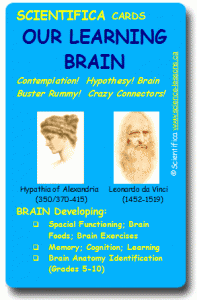 To Hypothesize; to speculate; to believe especially on uncertain or tentative grounds; the first step in the scientific process of providing proof of invented theory. To Think; Famous Genius Hypathia of Alexandria (350/370-415 A.D.) was noted for saying, “Reserve your Right to Think, for to think wrongly is far better than to not think at all”.Our awesome Science Learning Book Our Learning Brain is Now Available in Printed Book Full Color with Amazon Books.
To Hypothesize; to speculate; to believe especially on uncertain or tentative grounds; the first step in the scientific process of providing proof of invented theory. To Think; Famous Genius Hypathia of Alexandria (350/370-415 A.D.) was noted for saying, “Reserve your Right to Think, for to think wrongly is far better than to not think at all”.Our awesome Science Learning Book Our Learning Brain is Now Available in Printed Book Full Color with Amazon Books.
Our Learning Brain includes these 4 Great Games: Brain Buster Rummy; Crazy Connectors! (like Crazy 8’s); Contemplation! (like Solitaire and Patience); and Hypothesy! (An Old-Fashioned A & Q Game). Cards are similar to a traditional playing deck of cards, with 4 suits of 13 cards, all with different facts about each category; and 4 card games; Suitable for Grades 5-10. The games themselves, are easily comprehensible for the earlier grades, while the species identification aspects are brain teasers for the older grades.
CAUTION: Once Students begin, they cannot stop Playing!
Now Available in Printed Book Full Color with Amazon Black & White Version; Printed Book Form Amazon (Click on link for Book Form ordering)
Tasks include achieving Brain Anatomy Identification; Learning . All Science Activities and Games are designed to achieve Elementary and Junior High School Level Science Requirements also including aspects of Mathematics & Communication. Scientifically Proven to Increase Memory & Cognition; Understanding physical properties, structures and changes of Earth materials and Living Organisms and the properties of rocks, soil, water, and air; Identifying and categorizing living organisms; Understanding how components, structures, organizations, and interconnections describe systems; Adding, Reasoning, memory problem solving, and communication; Work collaboratively, find solutions and perform tasks…
And also available through our Blue Butterfly Books site!
Have a Very Merry Christmas! Happy Hannukah! and a Warm Wonderful Winter Solstice!
]]>When emphasis is placed on grading, children become more concerned with achieving the grade than on the journey in achieving the grade, sometimes associating their “goodness” then, with the grade. An achiever-style A/B student can show achievement and success, though more often than not, it can be detrimental to the student’s self-esteem. The child’s struggle and focus can become a goal for the teacher’s acceptance, literally surpassing the learning aspect altogether.
Pedagogue, Alfie Kohn calls this “chasing the carrot” or “avoiding the stick” in his text What Does it Mean to be Well Educated? (2004). Kohn suggests that rewarding students for a certain grade can be as damaging as punishing for not having done so. Both methods skip over the central core of a student – the natural joy and thirst for learning. This natural thirst and joy for learning is present in children, so obviously in the early years. Though once introduced to the system of grading, the child can subconsciously develop strategizing – a subtle form of innocent manipulation to work at receiving that age-old important authority / parental / teacher’s acceptance.
Focusing on the importance of grades can breed memorizer students – those who practice memory techniques to give back to a teacher what the student thinks the teacher wants, rather than the optimal learner students. Even though memorizing can be an effective study tool, memorizing is not likely the quality learning result that a teacher truly wants for the student.
Where grading may be an important part of the educational system, it is only effective if minimal importance of it is placed upon the psyche of the child. Introducing games in the curriculum of a child’s schooling reminds the child that learning is by its very own nature, supposed to be fun. Designing curriculum that regularly incorporates left-brain/right-brain activities such as spatial functioning card games, both encourages the child to desire learning again (what was once a natural thing), and while literally developing new healthy dendrites in the child’s growing brain.
For an example on Teaching Through Inspiration, here are some of our Fun Interactive Science Learning Games:
http://www.science-lessons.ca/games/mammals.html
http://www.science-lessons.ca/games/ocean.html
http://www.science-lessons.ca/games/birds.html
]]>